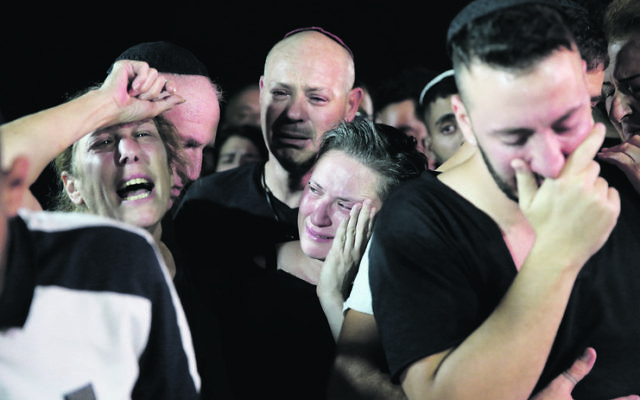Israeli, Arab workers reeling from terror attack
A YOUNG mother cheerily walked through the gate of Barkan Industrial Park on Sunday morning. Soon afterwards, her colleague and killer ran out of the same gate, with her blood on his hands.
A YOUNG mother cheerily walked through the gate of Barkan Industrial Park on Sunday morning. Soon afterwards, her colleague and killer ran out of the same gate, with her blood on his hands.
The 23-year-old Palestinian started work as normal, but then tied up and killed Kim Levengrond-Yehezkel, and another colleague Ziv Hajbi, before fleeing.
Ashraf Walid Suleiman Na’alowa also shot at another employee of the Alon Group, Sara Vaturi, who is recovering. She said afterwards that she cowered under a desk after being shot. She knew that she was bleeding but didn’t try to escape because she feared more violence. Her hunch was correct because as she hid, “I heard four or five more loud gunshots.”
As The AJN went to press, the attacker was still on the run. The gate was shut tight and the normally-bustling factory it leads to was motionless. The company had planned to reopen, but staff were still at home crying. Even the famous Israeli resilience has limits.
“This incident is shaking us up badly,” said Roni Huri, director of the Barkan Industrial Park, told me close to the terror scene. He had clear memories of Hajbi, a 35-year-old father-of-three, as a “gentle and kind man”.
During Hajbi’s funeral his brother Or said, “I want so much to wake up from this nightmare and I cannot.”
Levengrond-Yehezkel was remembered as a bubbly character and a dedicated mother to her 15-month-old baby. Her cousin said in a eulogy, “Your constant laughter is no more.”
At Barkan, the pain cut across divisions of nationality and religion. Unusually for the West Bank. Jews and Arabs work together at the park, with the 7200 workers coming more-or-less equally from the two populations. And people were united in outrage.
“I’m still digesting it,” said Ofer Meir, international marketing director at Ofertex textile manufacturers. “I don’t know what to think — it’s terrible.”
Behind the counter of a mini market at the centre of the park Asi Muhammad, an Arab shopkeeper, said emotionally, “Everyone is crying because of this thing.”
Muhammad was shocked by the sudden violence in a place that is normally characterised by friendly relations. “I’ve been here for 25 years and everything has been quiet,” he said.
Muhammad lives in Israel but most of the Arab workers are Palestinians, like Abed Titi, a 26-year-old cook. Titi said that Palestinian workers are united in opposition to the killer, and feel a connection to Jews they work with. “I know people here,” he said. “I know their names, I help people and they help me.”
Workers were incredulous that other Palestinians were celebrating the deaths. Hamas has called the attack “heroic” and pictures were published on social media of people handing out sweets as an expression of joy in Khan Yunis in the southern Gaza Strip.
One Palestinian, speaking on condition of anonymity at the Barkan factory where he works, said, “You know why they behave like this? Because they don’t work in a place like this. If Gazans worked here they’d feel differently.”
Settlement industrial parks are controversial. The international community disapproves of them. The Palestinian Authority decries industrial parks in the settlements, and has on occasions tried to pressure workers to leave jobs there. But Palestinian employees tend to say that they provide job security and good pay and conditions, which are hard to come by in the West Bank.
Titi said, “People here earn double the salary, and I earn maybe three times, what we would earn working for Palestinians.” Another Arab worker, who asked not to have his name publicised, noted that employees are treated with respect. “I’ve worked here for six years and never came across a manager who defined people as Jew and Arab — everyone is together,” he said.
Jewish workers tend to be philosophical about the attack, confident that calm will return. But it has left Palestinian employees unsettled.
Moshe Lev-Ran, a senior manager at Twitoplast, said that when he heard about the attack down the road from his factory “the first thing I did was to ask the Palestinian employees to come, and told them what had happened.”
They were worried that the Israeli government might revoke their work permits following the attack, and “angry at this Palestinian who had harmed Palestinians,” reported Lev-Ran.
The life of Palestinians is already changing as a result of the attacks. Security for Palestiniane making their way in to the park used to take moments; now it takes hours. “Everyone is in chaos now because of the attack,” said 27-year-old Hamad Beker, explaining that he now needs to get up hours before he used to and stand in long queues for security checks.
Israel’s President Reuven Rivlin called the attack an assault on coexistence. “I am shocked and saddened by this morning’s terrible terrorist attack at the Barkan industrial area,” he said just after hearing the news. “This was not only an attack on innocent people going about their daily lives, it was also an attack on the possibility of Israelis and Palestinians co-existing peacefully.”
Prime Minister Benjamin Netanyahu commented, “This was a very severe terrorist attack in which two Israelis were brutally murdered and a citizen was also wounded.
“The security forces are in pursuit of the reprehensible murderer. I am certain that they will apprehend him and I am also certain that we will deal with him to the fullest extent of the law and quickly.”
NATHAN JEFFAY


comments